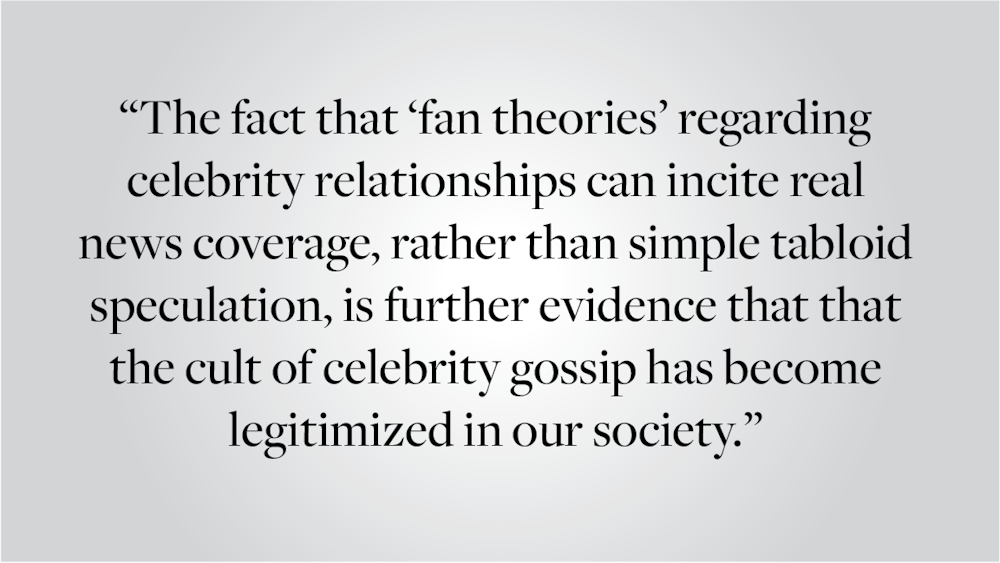Federico Fellini’s 1960 classic film “La Dolce Vita” — which coined the term “paparazzi” — offered one of the first critiques of the banal absurdity of popular interest in celebrities’ personal lives. In the film, Anita Ekberg plays a Swedish actress not unlike herself. In one scene, international journalists grill her with questions ranging in topic from what she thinks of French New Wave cinema to whether or not she likes to date Italian men.
Some 60 years later, that invasive culture persists. Swaths of “everyday people” read sources ranging from The Daily Mail to People Magazine to stay current on who their favorite musician is dating, whether their favorite athlete really did cheat with the nanny or what their favorite actress spreads on her toast in the morning. This culture is so entrenched that few seem to wonder why any of this information is important or even relevant. However, this paradigm of celebrity news fosters a strange obsession with the rich and famous, promotes misogynistic standards in the media and enables a bizarre and unnecessary invasion of celebrity privacy to satisfy reader consumption.
After all, why should it matter which celebrity is dating whom? Whether or not I like Ben Affleck’s films, his marriage to one Jennifer or another couldn’t possibly affect my daily life. Yet it is covered simply because consumers happily consume news on the rich and famous. With the spat of recent headlines devoted to the billionaire space race, people have begun to question to what degree the press should focus on the activities of the wealthy. But, as unnecessary as this news attention may be, it is nowhere near as frivolous as coverage of “fan theories,” like rumors about Chris Evans and Selena Gomez’s potential relationship. The fact that fan theories regarding celebrity relationships can incite real news coverage, rather than simple tabloid speculation, is further evidence that the cult of celebrity gossip has become legitimized in our society.
Celebrity gossip speculation might seem innocuous were it not for its reinforcement of misogynistic standards in the media. A classic example is the ongoing attention paid to Taylor Swift’s dating life. Though the coverage itself does not stem uniquely from the fact that she is a woman, the way that the media has scrutinized her certainly suggests a sexist bent. For publicly dating multiple men, she is called a “maneater” and subjected to forensically detailed rundowns on each of her break-ups and which former boyfriends had nice things to say about her. Beyond relationships, the media viciously dissects the appearances of famous women. One pernicious example of this phenomenon is the tabloid subgenre of celebrity pregnancy rumors. For wearing loose-fitting clothing or for having a less than pancake-flat abdomen, middle-aged celebrities are presumed to be pregnant and have to either confirm or deny these rumors in order to banish them. Any woman who has grown above a size two will have to answer for her weight gain — not to mention plus-size women, whose media scrutiny reaches another level. By putting female celebrities’ appearances and romantic lives under a microscope, gossip reporting validates and propagates misogyny beyond tabloid pages.
Our collective curiosity about the home lives of our favorite celebrities also leads us to accept breaches of privacy that we would otherwise balk at. This is not to say that rich and famous celebrities are downtrodden victims whom we must strive to protect, but we seem to be more willing to invade their personal space than that of our friends. In 2015, California passed a law to ban drone photography on private property as a response to celebrity outrage over invasions of privacy. But, as recently as 2020, Prince Harry and Meghan Markle filed and won a lawsuit against a celebrity photo agency for their illegal drone use. This episode proves that while California’s 2015 law can be useful, it hasn’t addressed the root cause of intrusive celebrity photography: the insatiable curiosity of readers. When paparazzi photograph celebrities’ children, they cross another boundary. In 2014, Kristen Bell and Dax Shepard launched an effort to hold mainstream news outlets accountable for running paparazzi photos of young children. Such an effort hasn’t stopped gossip outlets from getting their shots of underaged subjects, but it is a start in decommodifying celebrities and their personal lives, especially when it comes to kids who have no say in the matter. Finally, privacy invasion can have fatal consequences — look no further than the tragic case of Princess Diana, whose 1997 death was at least partially attributed to paparazzi that swarmed her car on that fateful night in Paris.
The right to privacy should be a universal principle, regardless of celebrity status. When we don’t respect boundaries around celebrities’ personal lives in the media, our collective psyche can fall victim to uncontrollable obsession. Celebrity fan theories are all fun and games until they have tangible consequences for the real people behind the media personas and for the social order that we create. Ultimately, buttressed as it is by a highly profitable industry, it’s unlikely that celebrity gossip will decline in popularity any time soon. But that shouldn’t stop us from being skeptical of the content that we consume as “popular culture,” nor from considering how on Earth Bennifer should find relevance in our daily lives.
Yasmeen Gaber ’23 can be reached at yasmeen_gaber@brown.edu. Please send responses to this opinion to letters@browndailyherald.com and other op-eds to opinions@browndailyherald.com.





